Wellness Care and Vaccines for Adult Dogs
As partners in your dog's life-long healthcare, Blue Springs Animal Hospital takes a proactive approach to wellness recommendations. Our goal is a long and healthy life for your dog, and we believe strongly that preventative wellness care is the primary way to achieve that objective. Visit our Puppy Wellness page for information on puppy recommendations before the first year of life.
Why are physical examinations by a veterinarian important for my dog?

Comprehensive Physical Examinations are the most important part of our wellness program.
Veterinarians are trained to detect abnormalities on physical exam that owners might miss, such as heart murmurs, abdominal organ enlargements, ear and eye conditions, and many other problems which pets can not communicate. Early detection, recognition, and timely intervention of medical conditions are the key to successful treatment and a long, healthy life for pets.
We recommend exams twice yearly on healthy pets because pets age 7 years for every year of our life. By seeing your pet every 6 months – 3 1/2 pet years – our doctor’s can perform a complete and thorough exam from nose to toes to detect problems early when therapy is most effective.
Although we recommend twice yearly exams, if clients prefer to only bring their pets once per year we are happy to accommodate that preference and schedule accordingly.
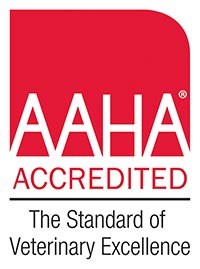
What vaccinations are needed for adult dogs in the Kansas City area?
Our veterinarians monitor local risks for contagious diseases and make specific recommendations to protect dogs in our area while being mindful to avoid unnecessary vaccinations. As an American Animal Hospital Association (AAHA) accredited hospital for more than 30 years, we closely follow the latest research and adhere to AAHA's highest standards of care.
The following video produced by the American Animal Hospital Association provides a good summary of the best practices veterinarians should consider when creating vaccine protocols for dogs:
Vaccinations are absolutely critical for dogs to protect them against contagious diseases, but vaccination should not be given more frequently than necessary. Research indicates that some vaccinations provide immunity for more than 1 year. Other vaccinations provide immunity for LESS than 1 year. For example, most adult dogs should be vaccinated every 6 months for bordetella, but only every 2 years for Distemper/Parvo.
At Blue Springs Animal Hospital we consider all these factors to create a vaccine protocol that is tailored to your pet's needs and risks of exposure with the desire to provide the very best care for our patients.
Vaccines which may be recommended for your pet include:
- Canine DHPP: This vaccine includes diseases like Distemper and Parvo which can cause serious illness or death. These are recommended for all puppies and adult dogs and are administered at sequential ages with the final puppy series booster at 4-6 months of age. Boostered again in 1 year and then every 2-3 years.
- Canine Leptospirosis: Deadly disease in the Kansas City area which is contagious to people as well as dogs. Administered twice during the puppy series and repeated yearly.
- Canine Bordetella: Contagious respiratory infection. Given once in the puppy series with boosters every 6 mos.
- Canine Influenza Virus: Contagious respiratory infection which causes serious pnuemonia in 20% of infected dogs. Given twice in the puppy series with boosters yearly.
- Rabies: Administered once to puppies and repeated every 1-3 years.
Other vaccines such as Lyme Disease may be recommended at an additional charge only for pets with significant exposure risks.
Does my dog need deworming and parasite prevention?
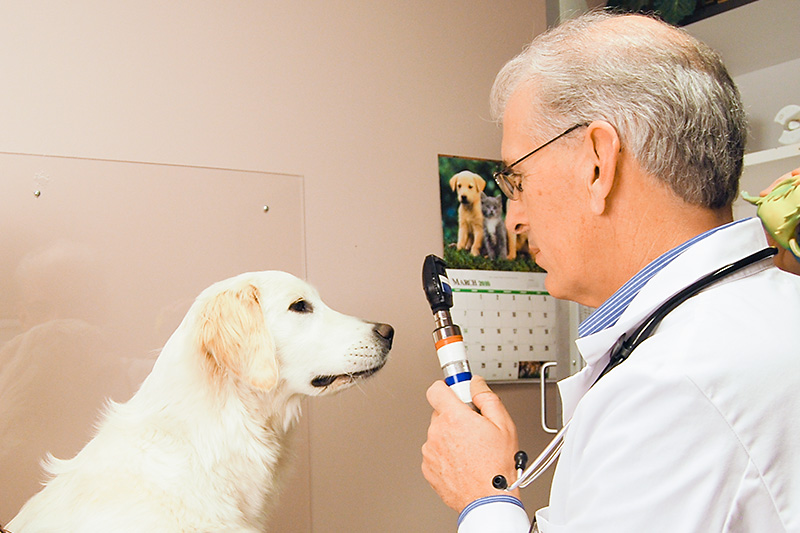
Intestinal Parasites
Internal parasite prevention is an important health care concern for pets and their human family. The Centers For Disease Control (CDC) reports many cases each year of parasitic diseases which are contagious from pets to people. Most of these diseases could have easily been prevented with routine veterinary care. The CDC has produced a brochure for pet parents entitled "What every pet owner should know about roundworms & hookworms". Another excellent resource for additional information about parasites is the Companion Animal Parasite Council.
Almost all puppies have intestinal worms or other parasites and should be tested and dewormed at their wellness visits. After the puppy parasite burden is treated and the dog reaches adulthood we recommend testing for parasites at each wellness visit.
We perform and recommend fecal testing by centrifugation, which has been shown to be much more reliable than the more common fecal floatation. Please bring a fresh, tea spoon sized stool sample in a zip lock baggie to your dog's wellness care appointment.
Heartworms
In the Kansas City area there is a significant risk for heartworm infections in dogs, whether they live primarily indoors or outdoors. Heartworms are not contagious from pets to people, but they cause a serious disease in dogs resulting in respiratory and heart damage which may be fatal. Often dogs show no symptoms of the infection until severe damage has already occurred.
The cost to treat a dog for heartworms is substantial, whereas prevention is only a few dollars per month. Dogs must be tested before starting prevention and then annually to monitor for infection. Testing is important because dogs can have a potentially life threatening reaction if they have heartworms and are given a preventative.
We recommend giving a preventative once monthly year around. Our veterinarians will discuss your pets needs and recommend a specific product for your pet.
For more information on heartworms, view the video below or visit the American Heartworm Society website.
.
Fleas and Ticks
External parasite control is important for the comfort of your pet and because fleas and ticks can transmit diseases. Fleas often carry tapeworms and ticks carry several dangerous diseases diagnosed in our area in both people and pets, including Lyme disease, Ehrlichiosis, and Rocky Mountain Spotted Fever.
The Centers for Disease Control (CDC) has identified Missouri as a high risk area for tick borne diseases due to multiple species of ticks that are common in this area and capable of spreading diseases.
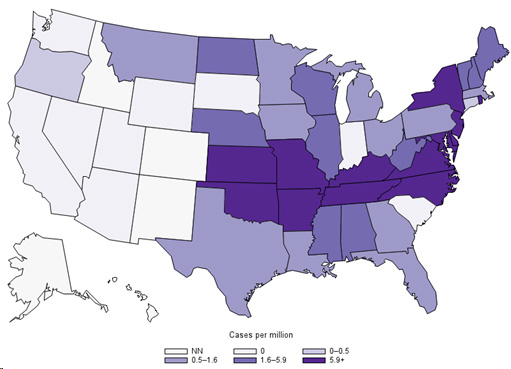
Choosing a safe and effective product to prevent fleas and ticks can be a confusing decision. Many available over the counter flea and tick products are ineffective or even unsafe. Adding to the confusion, some safe and effective products work well in certain circumstances, but not in others. Our veterinarians will help you evaluate your pet’s risks, and recommend a product for your dog.
The video below illustrates why it is important to prevent fleas. Just one flea can lay 50 eggs in your home or yard in one day! Multiply that by several fleas over several days, and it becomes clear why prevention is a good idea.
Should my healthy adult dog have screening blood work?
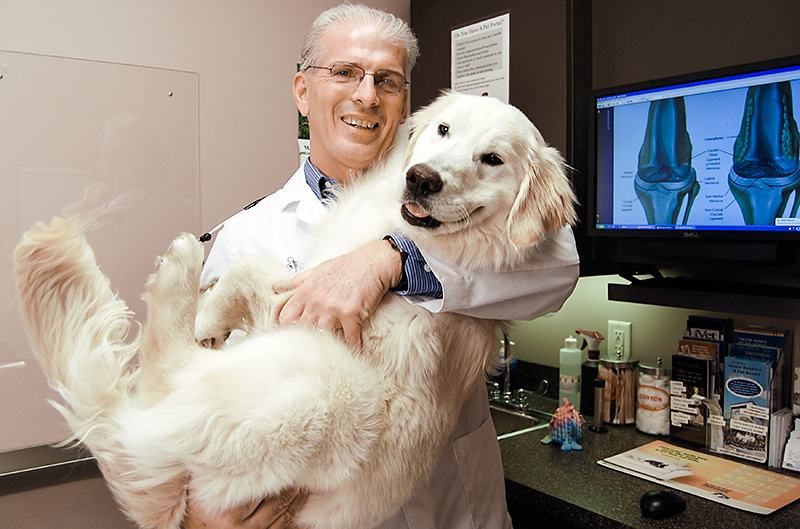
Wellness Blood Work is like an internal physical examination for your dog. It can detect hidden diseases like diabetes, kidney disease, liver disease, thyroid disease, and anemia which can not be diagnosed based upon symptoms or a physical exam alone.
Early diagnosis and intervention can significantly affect your pet’s response to therapy. We recommend a mini-profile on healthy younger dogs and a complete blood profile and urinalysis on healthy senior dogs once yearly. Pets with chronic illness or on medications may require more frequent checks.
What else will my dog's wellness visit at Blue Springs Animal Hospital include?
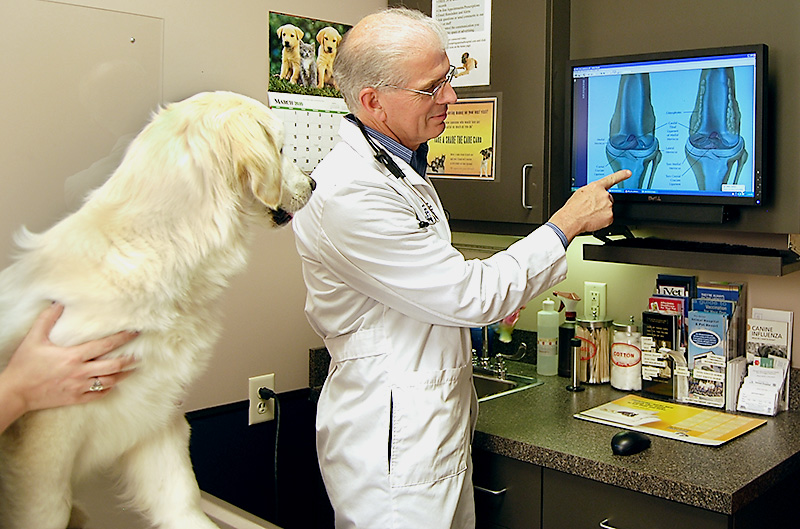
Client Education is a top priority for our veterinarians and staff. In addition to a physical examination, appropriate vaccinations, and parasite testing and prevention, our veterinarians will discuss nutrition, behavioral issues, breed specific conditions, and/or any other topics of importance to you and your pet during your wellness examinations.
Through prevention, early detection and timely intervention, together we can have a tremendous impact on the quality of life and longevity of your pet.

Customer Reviews of Canine Wellness Care at Blue Springs Animal Hospital
I can honestly say, this is the best vet I’ve personally ever been too. I am thankful for the staff and the services. We’ve seen a few different doctors there starting with Dr. Groh for allergies for Gunner, he’s absolutely amazing and explains everything very well and just an all around great guy with a very funny sense of humor (let him tell you some jokes), we’ve seen Dr. Emily, Dr. O’Brian and yesterday Dr. Gerlach. This vets office never hesitates to get us when when we need it, and I couldn’t be anymore thankful for that. The doctors are absolutely amazing one of our pups suffer from anxiety and is nervous all the time, the doctors actually get down on the ground on his level to make him more comfortable to do the exams and I am so glad I can trust this place to take care of our pups when needed and fast. So THANK YOU Blue Springs Animal Hospital for just making this an amazing experience and I’m so glad we have you guys to go too!

The staff here is incredible. We live 40 minutes away and make the drive just so our dog can have the best care!


My family recently moved to the area, and we were looking around for a vet for my two dogs. I loved the idea of finding a vet, boarding, and daycare facility all in one, so I could use the same place regardless of what kind of care I needed for my pets. One of my dogs started to get sick, so I decided to choose this animal hospital so he could get all-inclusive care. I took my pup here three times over the course of about a week, and each visit was met with wonderful, caring, and knowledgeable staff. My veterinarian, Dr. Dear, performed many tests on my pup to help diagnose him and try to get him well again. I was so thankful for the diagnostic capabilities of this hospital and the sweet staff members who took such good care of my boy. Unfortunately, he had cancer, and it was his time to go. Although heartbreaking, our dog was able to be let go peacefully. The comfort room made it feel like he passed in a home instead of a hospital. Every person who interacted with our dog and our family was so kind, comforting, sweet, and understanding. We were able to take our time saying goodbye and Dr. Dear talked us calmly through the process of letting him go. I highly recommend using this facility for your pet's care. The veterinarians here have a wide range of expertise, the facility has a collaborative mindset to give each pet the best care, and there is a wide range of medical equipment available to diagnose and treat your pet.
Been taking my slew of pets here for 10 years. It is worth every penny and the staff is so amazing. I know they have saved my dogs life through their proactive screenings and they always make sure I know all my options for treatment. I will never go anywhere else.
I've been taking my dog for a year now for wellness and grooming services, the staff and Dr's are very professional and caring. Would definitely recommend.
Amazing staff period!! From the friendly welcoming staff to the vet staff that care for our dog this place is hands down the best. We love the care our dog gets here, I love that when my dog is scared the staff help me with him. It’s overwhelming when your dog drags his 60lbs of weight to the floor and refuses to go in one of the rooms and staff just wait and stare at you to drag them in… not here! They care and help your dog and don’t want you or other doggies and their owners feeling uneasy. They have half day and full day doggie daycare for a great price which includes playtime if you get there by 8:30 for morning and 12:30 for afternoon. They also have boarding and grooming. My dog actually gets excited when he knows he’s going to daycare. They go through a different door for him so he doesn’t have to associate day care with vet visit. I was so happy to see him walk right in with them. He had anxiety with getting his nails done from petsmart nipping him when he was younger and I’ve never had luck with other groomers, they just say we will try again next time and still had to pay. Here he got fully groomed, nails done and took pictures (they post to their FB) and he smells so good and is one happy pup! Wish I would have started this with him years ago here. Thank you guys for all you do!
Hands down the best vets office I have been to! Accommodating, never felt rush or like I was being ignored about my concerns. My dog loves them!













